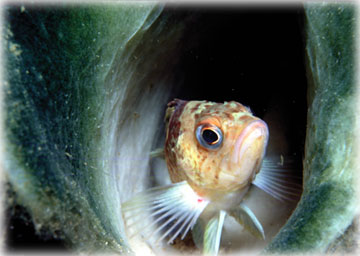 September 09, 2005
"The oldest rockfish we have seen in Alaska is a 205-year-old rougheye that was caught off Ketchikan a few years ago," said Milton Love, associate research biologist at the University of California Santa Barbara. "A number of rockfish species live to be well over 100 years old."
As their name implies, most rockfish species live primarily among coastal ledges, seamounts, large boulder patches, and outcroppings. Because they are long-lived, rockfish take decades to mature to breeding age. These facts, coupled with increasing sport and commercial fishing pressure, make managing rockfish especially difficult. In places like Washington, Oregon and California, some rockfish populations have all but collapsed. "Here in California, some species are down to ten percent of their unfished level," Love said. "It might take 80 to 90 years just to rebuild these stocks to 40 percent of their pre-fishing levels." While Alaska's 35 species of rockfish are faring better than rockfish elsewhere, there are signs that pressure is mounting, said Victoria O'Connell, a fisheries biologist with the Alaska Department of Fish and Game in Sitka. "It's a national problem and Alaska is beginning to suffer from it," O'Connell said. The health of Pacific rockfish stocks is the topic of the 23rd Lowell Wakefield Fisheries Symposium to be held in Anchorage Sept. 13-15. The symposium, "Biology, Assessment, and Management of North Pacific Rockfishes," is being held as part of the American Fisheries Society's 135th annual meeting. "The Lowell Wakefield series last focused on rockfish some 20 years ago," said Brian Allee, director of the Alaska Sea Grant Program. "This symposium will allow scientists to present their latest findings on a group of species that are still not well studied and understood, but that are facing increasing pressures from commercial and sport fishermen." Scientists from Alaska, California, Oregon, Washington and Idaho, as well as researchers from Mexico, Russia and British Columbia, will present results of studies on rockfish biology, taxonomy, stock assessment techniques and management strategies to promote sustainability and conservation. Love is the symposium's keynote speaker. O'Connell said the growing Southeast Alaska sport charter fishery over the last decade forced ADF&G this year to close the commercial rockfish fishery around Sitka, Ketchikan and Craig. In waters around Sitka, the sport charter fleet caught more yelloweye rockfish than was allocated for the area's entire directed commercial fleet. "The perception has always been that the sport catch is minimal," said O'Connell. "But that is not the case." Scientists also will discuss ways to conserve rockfish through habitat protections. One such area, called the Edgecumbe Pinnacles, is an undersea mountain that rises close to the ocean surface near Sitka. The pinnacle's massive boulders and outcroppings provide excellent habitat for a variety of rockfish species, O'Connell said. In 1998, the Edgecumbe Pinnacles was designated as the state's groundfish reserve. The area around the pinnacles is closed to fishing for groundfish and halibut. "In our undersea mapping efforts we have located a number of areas in Southeast that support good populations of rockfish," O'Connell said. "Some of the best yelloweye rockfish habitat have giant boulders and volcanic columnar basalts, and often have red tree corals growing on them." The 23rd Lowell Wakefield Fisheries Symposium is sponsored by Alaska Sea Grant, the Alaska Department of Fish and Game, NOAA Fisheries, NOAA Research, North Pacific Fishery Management Council, and the Wakefield Endowment. The Lowell Wakefield Fisheries Symposium series began in 1982. The meetings provide a forum for information exchange in biology, management, economics and processing of fish species and complexes, as well as an opportunity for scientists from high-latitude countries to discuss their work. The series is named after Lowell Wakefield, founder of the Alaska king crab industry. Wakefield recognized that resource management must be based on the best available scientific data. Since its inception, the Wakefield series has addressed subjects that are timely and key to the understanding and management of commercially harvested marine species in the North Pacific.
On the Web:
Source of News:
Publish A Letter on SitNews Read Letters/Opinions Submit A Letter to the Editor
|
||
